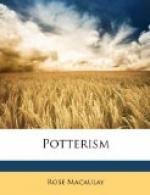Jane looked at her son, the strange little animal, and thought not ‘Potter for ever,’ but ‘me for ever,’ as was natural, and as parents will think of their young, who will carry them down the ages in an ever more distant but never lost immortality, an atom of dust borne on the hurrying stream. Jane, who believed in no other personal immortality, found it in this little Potter in her arms. Holding him close, she loved him, in a curious, new, physical way. So this was motherhood, this queer, sensuous, cherishing love. It would have been a pity not to have known it; it was, after all, an emotion, more profound than most.
2
When Jane was well enough, she gave a party for Charles, as if he had been a new picture she had painted and wanted to show off. Her friends came and looked at him, and thought how clever of her to have had him, all complete and alive and jolly like that, a real baby. He was better than the books and things they wrote, because he was more alive, and would also last longer, with luck. Their books wouldn’t have a run of four score years and ten or whatever it was; they’d be lucky if any one thought of them again in five years.
But partly Jane gave the party to show people that Charles didn’t monopolise her, that she was well and active again, and ready for work and life. If she wasn’t careful, she might come to be regarded as the mere mother, and dropped out.
Johnny said, grinning amiably at her and Charles, ’Ah, you’re thinking that your masterpiece quite puts mine in the shade, aren’t you, old thing.’
He had a novel just out. It was as good as most young men’s first novels.
‘I’m not sure,’ said Jane, ’that Charles is my masterpiece. Wait till the other works appear, and I’ll tell you.’
Johnny grinned more, supposing that she meant the little Yids.
‘My books, I mean,’ Jane added quickly.
‘Oh, your books.’
‘They’re going to be better than yours, my dear,’ said Jane. ’Wait and see.... But I dare say they won’t be as good as this.’ She appraised Charles with her eyes.
‘But, oh, so much less trouble,’ she added, swinging him up and down.
‘I could have one as good as that,’ said Johnny thoughtfully, ’with no trouble at all.’
’You’d have to work for it and keep it. And its mother. You wouldn’t like that, you know.... Of course you ought to. It’s your duty. Every young man who survives.... Daddy says so. You’d better do it, John. You’re getting on, you know.’
Young men hate getting on. They hate it, really, more than young women do. Youth is of such immense value, in almost any career, but particularly to the young writer.
But Johnny only said, with apparent nonchalance, ’Twenty-seven is not very old.’ He added, however, ’Anyhow, you’re five minutes older, and I’ve published a book, if you have produced that thing.’
Johnny was frankly greedy about his book. He hung on reviews; he asked for it in bookshops, and expressed astonishment and contempt when they had not got it. And it was, after all, nothing to make a song about, Jane thought. It wasn’t positively discreditable to its writer, like most novels, but it was a very normal book, by a very normal cleverish young man. Johnny wasn’t sure that his publishers advertised it as much as was desirable.




